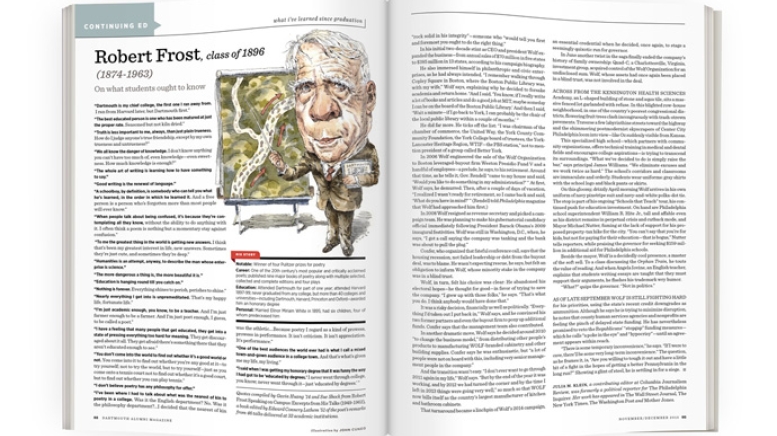Notable: Winner of four Pulitzer prizes for poetry
Career: One of the 20th century’s most popular and critically acclaimed poets; published nine major books of poetry along with multiple selected, collected and complete editions and four plays
Education: Attended Dartmouth for part of one year; attended Harvard 1897-99; never graduated from any college, but more than 40 colleges and universities—including Dartmouth, Harvard, Princeton and Oxford—awarded him an honorary degree
Personal: Married Elinor Miriam White in 1895; had six children, four of whom predeceased him
“Dartmouth is my chief college, the first one I ran away from. I ran from Harvard later, but Dartmouth first.”
“The best educated person is one who has been matured at just the proper rate. Seasoned but not kiln dried.”
“Truth is less important to me, always, than just plain trueness. How do I judge anyone’s true friendship, except by my own trueness and untrueness?”
“We all know the danger of knowledge. I don’t know anything you can’t have too much of, even knowledge—even sweetness. How much knowledge is enough?”
“The whole art of writing is learning how to have something to say.”
“Good writing is the renewal of language.”
“A schoolboy, by definition, is somebody who can tell you what he’s learned, in the order in which he learned it. And a free person is a person who’s forgotten more than most people will ever know.”
“When people talk about being confused, it’s because they’re contemplating all they know, without the ability to do anything with it. I often think a poem is nothing but a momentary stay against confusion.”
“To me the greatest thing in the world is getting new answers. I think that’s been my greatest interest in life, new answers. Sometimes they’re just cute, and sometimes they’re deep.”
“Humanities is an attempt, anyway, to describe the man whose enterprise is science.”
“The more dangerous a thing is, the more beautiful it is.”
“Education is hanging round till you catch on.”
“Nothing is forever. Everything shines to perish, perishes to shine.”
“Nearly everything I get into is unpremeditated. That’s my happy life, fortunate life.”
“I’m just academic enough, you know, to be a teacher. And I’m just farmer enough to be a farmer. And I’m just poet enough, I guess, to be called a poet.”
“I have a feeling that many people that get educated, they get into a state of pressing everything too hard for meaning. They get discouraged about it all. They get afraid there’s something there that they aren’t educated enough to see.”
“You don’t come into the world to find out whether it’s a good world or not. You come into it to find out whether you’re any good at it—to try yourself; not to try the world, but to try yourself—just as you come onto a tennis court not to find out whether it’s a good court, but to find out whether you can play tennis.”
“I don’t believe poetry has any philosophy for offer.”
“I’ve been where I had to talk about what was the nearest of kin to poetry in a college. Was it the English department? No. Was it the philosophy department?…I decided that the nearest of kin was the athletic….Because poetry I regard as a kind of prowess, prowess in performance. It isn’t criticism. It isn’t appreciation. It’s performance.”
“One of the best audiences the world ever had is what I call a mixed town-and-gown audience in a college town. And that’s what’s given me my life, my living.”
“I said when I was getting my honorary degree that it was funny the way I had got to be ‘educated by degrees.’ I never went through college, you know; never went through it—just ‘educated by degrees.’ ”
Quotes compiled by Gavin Huang ’14 and Sue Shock from Robert Frost Speaking on Campus: Excerpts from His Talks (1949-1962), a book edited by Edward Connery Lathem ’51 of the poet’s remarks from 46 talks delivered at 32 academic institutions.




